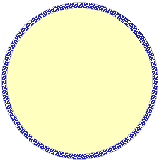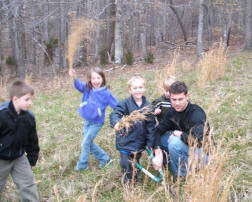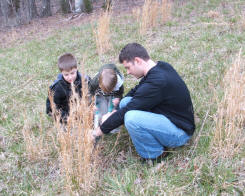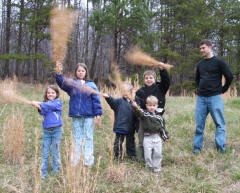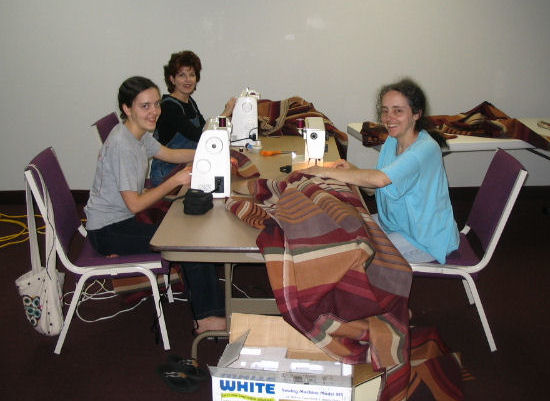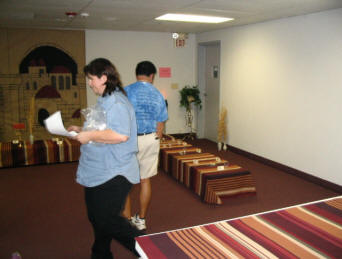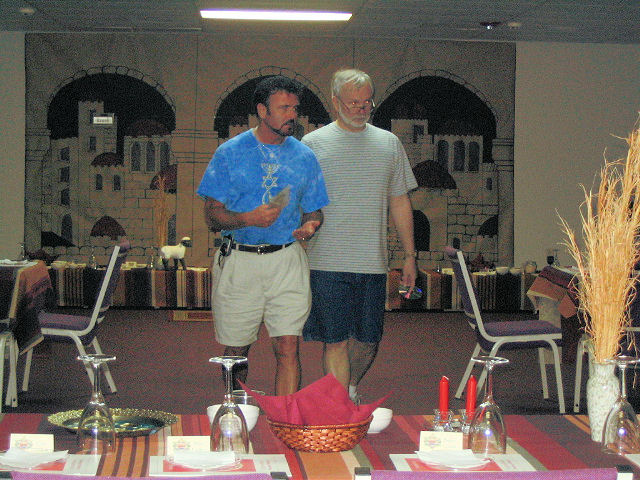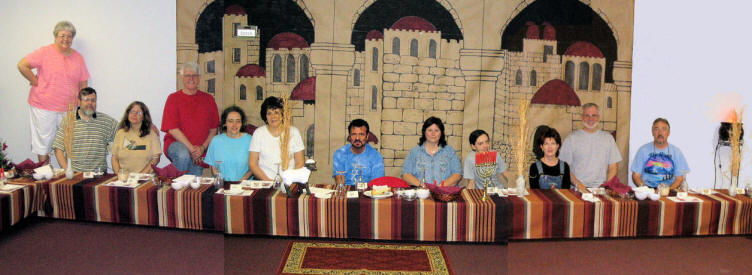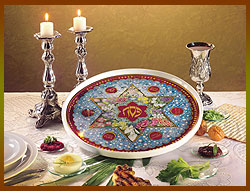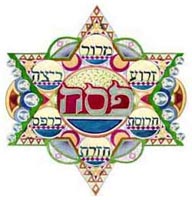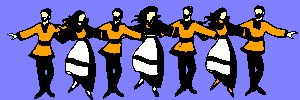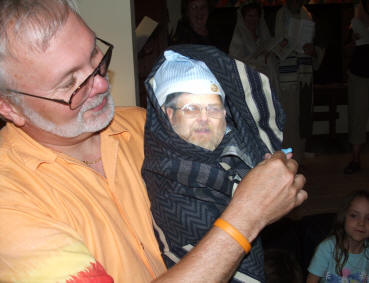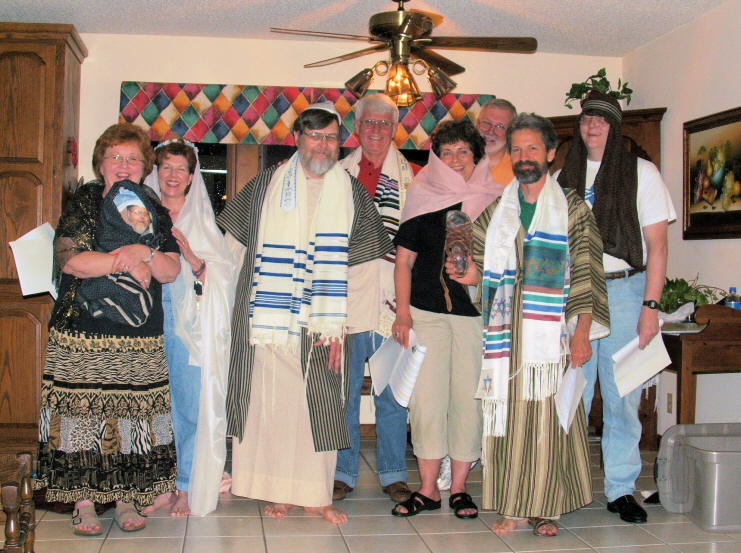Beit Yeshua
2006
January to May
Israeli
Folk Dance
Classes
PURIM
PESACH
SHAVUOT
In November of 2005, we moved our Israeli Dance Class to THE RIVER Church in Lincolnton.
Pastor Bill (left) and his congregation, THE RIVER, graciously opened the doors to their church and provided us a place to continue with our dance classes. We started off with plans to meet only once a month, but Bill encouraged us to meet more often. By February 2006, we had decided to start meeting twice a month.

At our new location, the Lord added numerous new dancers.
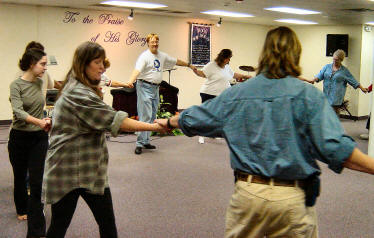
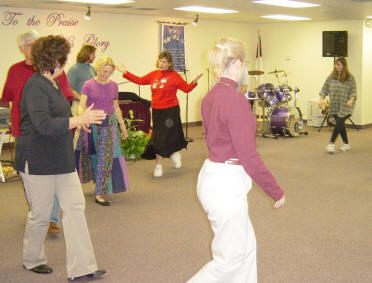
The Purim play is always loads of fun, but it's also a wonderful way of learning about Queen Esther and how God used her and Mordechai to keep the Jews from being destroyed at the hands of the wicked Haman.
This was our fourth annual Purim play.
Connie is the lovely Queen Esther.
Dan is King Ahashuerus.
Bruce is Mordechai.
King Ahashuerus casts aside Queen Vashti when she refuses to come at his beckoning call, and chooses a new Queen, Esther, from all the beautiful women in his kingdom...not knowing that she is Jewish.
Parts are assigned "on-the-spot" to keep reactions and the story spontaneous.
Parts aren't memorized, but read for the first time the night of the play.Andy is the wicked Haman. Sheryl is Haman's wife, Zeresh. Leslie is the deposed
Queen Vashti.
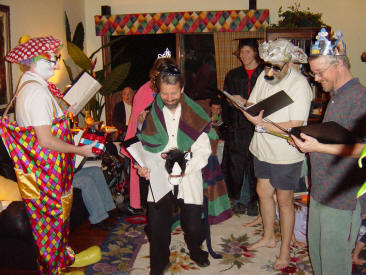
Mordechai is robed & led through the streets by Haman. King Ahashuerus extends his scepter to Queen Esther. Haman is hanged. Esther and the Jews are safe. There's always time for Praise,
Worship & DancePesach/Passover 2006 
Pesach/Passover is one of the seven festivals of the Lord mentioned in Leviticus 23. It is the first of the Spring festivals, occurring in March or April each year. In scripture, this date would be Nissan 14.
Pesach is the festival that brings to remembrance the deliverance of the Children of Israel from their slavery in Egypt. Through Moses, God commanded that blood from a lamb be smeared on the top lintel and two side posts of the door. At midnight, the LORD passed through and killed the firstborn of all the Egyptians. But when he saw the blood on the lintel and two side posts of the Doors of the Jewish homes, the LORD passed over that door and they were spared.Pastor Bill Shupp graciously allowed us to do our Pesach Seder at THE RIVER this year. It was a real blessing to us, and allowed us to share our fifth annual Pesach with his congregation. We had 70+ people signed up to come, so there was much to do in preparation. We did most of our shopping at Wal-Mart. We found the material for our tablecloths for $1-a-yard, and purchased three bolts of the fabric. We needed wine glasses for 70 people, but didn't really want to purchase glass ones, thinking they wouldn't store well from year-to-year and could easily break. Wal-Mart had hard, thick plastic 8-inch wine glasses for $2 each. The only problem, the store in Hickory only had fourteen. By the time we had all the wine glasses we needed, we had been to Wal-Marts in Hickory, Lincolnton, Statesville, Mooresville, Gastonia and Mocksville. We picked up some smaller disposable ones for the kids at Party City in Hickory. We didn't have enough Seder plates, so we used small bowls for the different components of the Seder meal. This was also the largest crowd we'd had in 5 years, so we need additional copies of our Haggadah. We had decided to use broomstraw as part of our decoration for the room where we would be having our Seder meal. Doug, his grandchildren and son, Lance, went out into the fields to cut some. You can imagine the questions that came from the kids in the process. "Papaw, why are we cutting this stuff?" "Passover? What's that?" Doug had numerous questions to answer.
Exodus 12:
26 And when your children ask you, "What does this ceremony mean to you?"
27 Then tell them, "It is the Passover sacrifice to the LORD, who passed over the houses of the Israelites in Egypt and spared our homes when he struck down the Egyptians." Then the people bowed down and worshiped.Kate, Myrl and Becky work on hemming the material for the table cloths.
This was the material we found at Wal-Mart for $1-a-yard.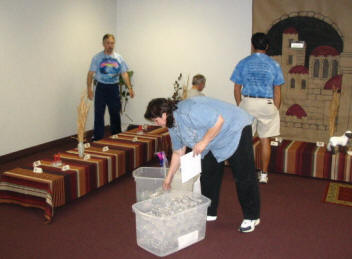
Low tables are set and the decorating begins. Doris Blount is busy putting out the wine glasses. Guests were given a choice of low/reclining tables or regular tables.
Doug cut plywood into 2ft. x 8ft. pieces for the low tables.
To soften the bright-white walls, Curtis decided to paint a mural of Jerusalem to go on the wall behind the low tables.
The mural was painted on thick paper so that it could be put up, taken down and used for several years.
Yossi and Curtis look over the finished product.
At the end of the evening, the set-up crew poses for a photo. It actually only took two hours to set up the room, including making the table cloths, hanging the wall mural, and putting out all the glasses, bowls, candles, baskets, Haggadas, broomstraw & place-cards.
Yeshua (Jesus), himself, participated in Pesach each year. Matthew 26
17 Now the first day of the feast of Unleavened Bread the disciples came to Jesus, saying unto him, Where wilt thou that we prepare for thee to eat the Passover?It was also during this Pesach Seder meal that Yeshua instituted communion. Matthew 26
26 And as they were eating, Jesus took bread, and blessed it, and brake it, and gave to the disciples and said, Take eat; this is my body.
27 And he took the cup, and gave thanks, and gave it to them, saying, Drink ye all of it.
28 For this is my blood of the new covenant, which is shed for many for the remission of sins.
Curtis sitting at the low tables. Some had requested to wear Biblical-type costumes on the night of the Seder.
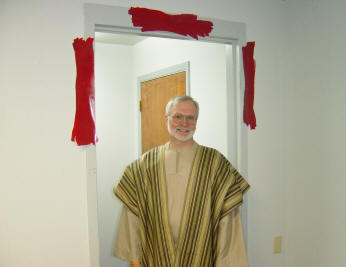
Blood (cardboard) was applied to the top & sides of the doorway. Curtis & Doug make last minute plans.
Doug & Lynda pose in front of the beautiful hand-painted silk flag by Spencer Williams.
Carolyn & Curtis with their daughter, Beth, & her husband, Brad, and granddaughter, Savanna.
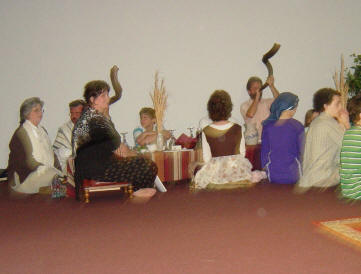
Shofarot were blown as we began our evening. Can you see four shofarot in the two photos?
Curtis & Doug led the Seder "Let us ready our hearts for the Passover Seder, the order of service. Everyone take your Haggadah, please. Haggadah means 'the Telling'. Passover is a story that has been told and retold for thousands of years. It is a story of miraculous transitions - from slavery to freedom, from despair to hope, from darkness to light. Its greatness is the greatness of God. Its timelessness comes from the eternal truth of His involvement with His people. Just as God cared for the children of Israel in ancient times, He cares for all who are His today."
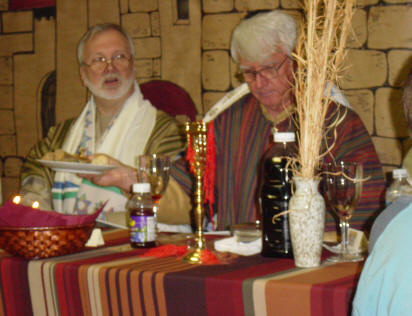
"Upon the table is a Seder plate, holding the ceremonial items of Passover. There are bitter herbs, a roasted egg, a sweet apple mixture, parsley, and a bone. Curious things, yet all part of the telling. Let us allow our senses to fully participate, taking in the sights and smells, tasting each ingredient, listening to every word."
"On all other nights we eat bread with leaven, but on Passover we eat only matzah, unleavened bread. As the children of Israel fled from Egypt, they did not have time for their dough to rise. Instead, the hot desert sun baked it flat. But even more than that, the scriptures teach us that leaven symbolizes sin."
We pause for the Passover meal. 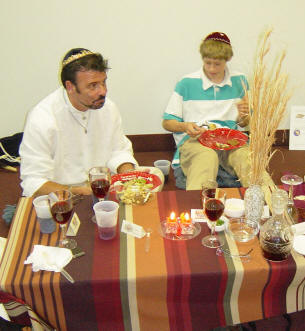
Yossi & Jesse Duke & Myrl - Bruce, Becky, Kate & Helen 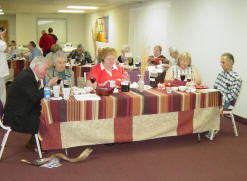
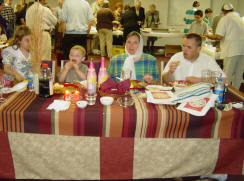
The RIVER folk The Fordhams came from South Carolina. Part of the Gates of Praise Group. 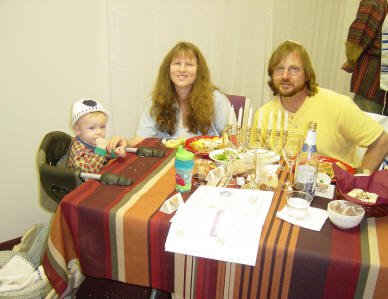
Patrick, Julie & Joseph drove down from Boone. Barry & Melba 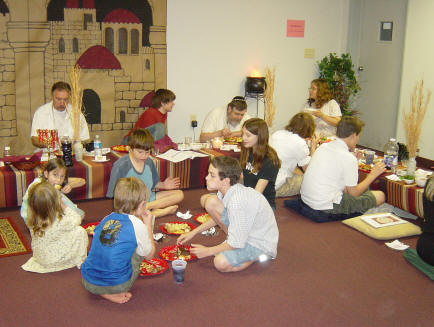
Families, children & teens
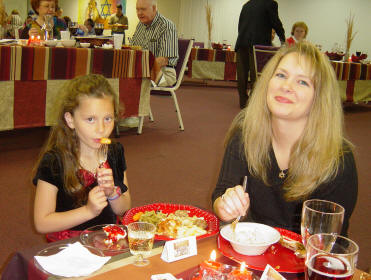
Savanna & Beth Andy & Jane
L'Shana HaBa'ah B'Yerushalayim!
Next Year in Jerusalem!
A time of Praise, Worship & Dance followed the Seder.
Dancing to "It is Good to Praise the Lord", by Paul Wilbur 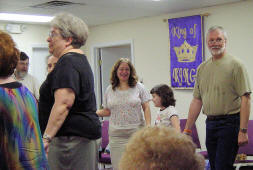
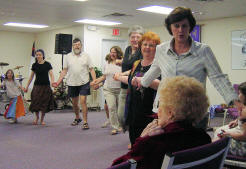
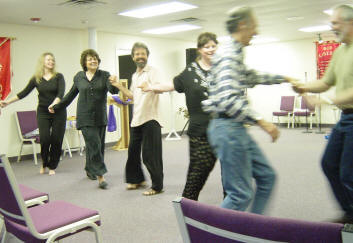
Shavuot/Pentecost is a harvest festival, celebrated each year at the time of the wheat harvest. The Bible says they were to start counting on the second day of Pesach (Feast of Unleavened Bread) and count 49 days. The 50th day is Shavuot. Shavuot is a Hebrew word that means weeks, because the festival occurs 7 weeks after Pesach. It is one of the 7 major festivals mentioned in Leviticus 23.
This was actually the first year that our small home group congregation had observed Shavuot together. For the previous five years, we had chosen to go to Black Mountain, NC for the CBU Shavuot Conference at Ridgecrest. There was no conference in Black Mountain this year, so it gave us a wonderful opportunity to observe the festival together as a smaller group.
There were several activities we had planned for the evening. We started with a discussion of the scriptures concerning the time from Pesach to Shavuot, and included a discussion of scriptures from the Tanach (Old Testament) and B'rit Hadasha (New Testament). It's customary to read the story of Ruth during Shavuot, because the story takes place during the harvest season. Ruth was the great-grandmother of King David, who traditionally is believed to have been born and died on Shavuot. "The Story of Ruth"
Long ago, when the Judges ruled Israel, the land of Canaan suffered a terrible famine. Elimelech, a prominent Jew from Bethlehem, took his wife, Naomi, and his two sons Mahlon and Kilion, to the land of Moab to escape the famine. The family settled there and the sons married Moabite women named Orpah and Ruth. Then, tragedy struck. First Elimelech, Naomi's husband, died, and then both of her sons. Naomi was suddenly a widow. All she had left were her two bereaved daughters-in-law, Orpah and Ruth.
After the deaths of their husbands, Naomi decides to return to Israel, telling her daughters-in-law to return to their own home lands.
Narrator, Naomi, Ruth and Orpah
Orpah returns to her homeland, but Ruth refuses to leave Naomi. She tells her mother-in-law, "Don't urge me to leave you. Where you go I will go, and where you stay I will stay. Your people will be my people and your God, my God. Where you die I will die, and there I will be buried. May the LORD deal with me, be it ever so severely, if anything but death separates you and me."
(Cast Left to Right)
Narrator: Carolyn, Naomi: Leslie, Ruth: Myrl, Orpah: Jane, Boaz: Andy, Director: Curtis, Elder: Doug,
Woman in the City: Lynda, Kinsman: Bruce and the Foreman of Boaz's servants: Kirk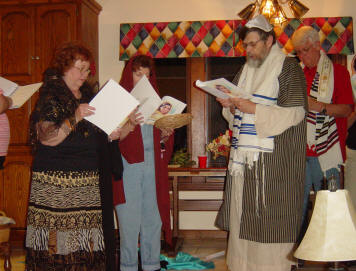
Upon returning to Israel, Ruth goes to the fields of a near-kinsman, Boaz, to gather grain for Naomi and herself. Boaz notices her, and she finds favor in his eyes. Boaz tells Ruth, "May Ha’Shem, blessed be His name, bless you, my daughter. All my fellow townsmen know that you are a woman of noble character. Although I am near of kin, there is a “kinsman-redeemer” nearer than I, who is entitled to marry you. In the morning if he wants to redeem you, then good; let him redeem you. But if he is not willing, as surely as the LORD lives I will redeem you and take you as my wife."
Boaz meet with his Kinsman and the elders of the city, where he tells the Kinsman about the recently widowed Ruth. When the Kinsman declines marriage to her, Boaz announces that he will take her as his wife.
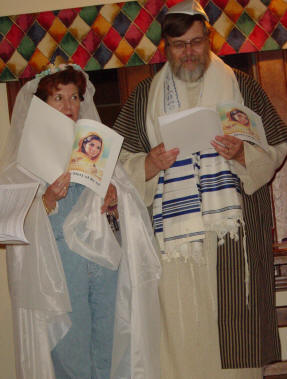
Boaz marries Ruth, and in time she gives birth to a child, Obed. Look at that BABY!
Through her marriage to Boaz, Ruth, a gentile, became the great-grandmother of King David ... the mother of the royal lineage of David. It was also from this lineage that our “Kinsman-Redeemer” came -Yeshua Ha’Mashiach, Yeshua the Messiah.
The evening concluded with a Torah game and a time of Praise & Worship.
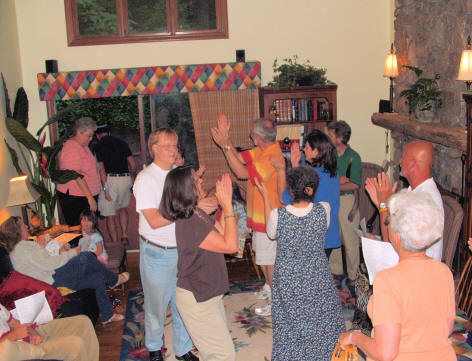
Click HERE to continue to 2006, page 2 - May to December
